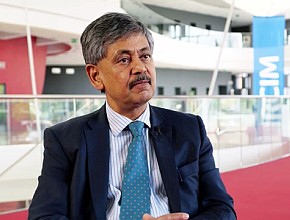Dr Bhaskar Dasgupta is a professor of rheumatology at Southend University Hospital, UK, honorary professor of Essex University, and international expert and key opinion leader in giant cell arteritis and polymyalgia rheumatica.
If you were to name the 3 most important recent advances in the management of systemic lupus erythematosus, what would they be?
Bhaskar Dasgupta, MB BS, MD: If one were to name the 3 most important recent advances in the management of systemic lupus [erythematosus] (SLE), I would really answer it with the following: One is the important realization that one needs to use [the] minimum effective [dose of] glucocorticoids in the treatment of lupus. This is extremely important because glucocorticoids have been shown to be associated with a lot of complications. When you treat long-term lupus for 5, 10 years, that’s when you get all the side effects of glucocorticoids related to myopathy, related to osteoporotic fractures, hypertension, but most importantly, you start getting all the cardiovascular complications that one associates with routine overtreatment with glucocorticoids, and you start getting increased cardiovascular events that are associated with lupus. So, the first most important recent advance has been the awareness that while active lupus may need treatment with high-dose glucocorticoids, these doses need to be quickly tapered down so that the baseline long-term treatment relates to safe doses; certainly <10 mg prednisolone or even ~5 mg prednisolone. This is allowed by the use of other immunosuppression for the treatment of lupus.
The second most important recent advance in the management of lupus has been belimumab. Belimumab is an antibody that is really directed at preventing B-cell activation. It is an anti–B cell activating factor (BAFF) or anti–B lymphocyte stimulator (BLyS) antibody and belimumab has really transformed the treatment of refractory lupus. We have recently had a case of multisystem lupus: a lady who presented with severe dermatitis, severe hypocomplementemia, severe serositis, arthritis, and she also developed glomerulonephritis, which actually led very quickly to end-stage renal disease. Then she developed valvulitis with Libman-Sacks endocarditis. She had exhausted cyclophosphamide, she had had mycophenolate, and finally we treated her with belimumab, which, of course, is the first biologic [agent] that has been licensed for use in SLE. And the response was magic-like. With the treatment with belimumab that we gave her, which was initially intravenous infusion, 10 mg/kg, she had a dramatic response in terms of all her dermatitis, serositis, everything resolving, and hypocomplementemia came back to normal. Finally, we have now switched her to subcutaneous preparation of belimumab and she is doing well to the extent that she has now had her renal transplant because she was dialysis bound. And post transplant she is doing very well on treatment with belimumab.
The third most important advance in the management of lupus has been the awareness of cardiovascular disease. It is so important to try and prevent the metabolic syndrome while one is treating lupus. It is not only important to check for disease activity of lupus; it is very, very important to try and maintain an optimal body weight, to try and control hypertension. The treatment of [abnormal] blood pressure in the context of lupus is extremely important and the lipids are important. The treatment of diabetes is important. All these need to be taken into account in terms of treating the metabolic syndrome to prevent the long-term cardiovascular events related to lupus. Thank you.
 English
English
 Español
Español
 українська
українська









